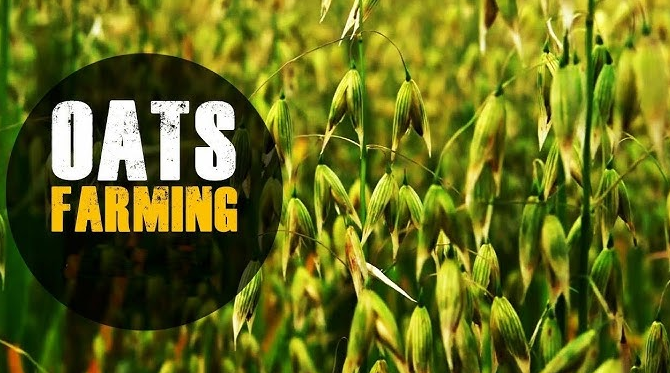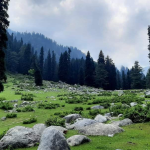OATS ON THE RISE
In recent years, the humble oat has garnered increasing attention as a vital food for the future. The World Health Organization (WHO) has lauded oats for their remarkable health benefits, declaring them a key component of future diets. This recognition is particularly significant in the context of Kashmir, where the Mountain Research Centre for Field Crops (MRCFC) and Sher-e-Kashmir University of Agricultural Sciences and Technology (SKUAST) Kashmir have been spearheading efforts to develop an oat variety tailored for human consumption. This groundbreaking research promises not only to enhance health outcomes but also to revolutionize the agricultural landscape and uplift the livelihoods of farmers across India.
The Growing Importance of Oats
Oats have long been celebrated for their numerous health benefits, making them a sought-after superfood. Their nutritional profile is impressive: oats are rich in beta-glucan, a type of soluble fiber that helps lower cholesterol levels, regulate blood sugar, and promote digestive health. The WHO’s endorsement of oats as a future food underscores their potential in addressing key health challenges, such as heart disease, diabetes, and obesity. Furthermore, oats are naturally gluten-free, which makes them an ideal choice for individuals with celiac disease or gluten intolerance.
MRCFC and SKUAST Kashmir: A Decade of Dedication
For over a decade, MRCFC Khudwani and SKUAST Kashmir have been at the forefront of oat research, striving to develop a variety of oats suitable for human consumption. This journey began with a clear vision: to create an oat that not only meets high nutritional standards but also adapts well to the unique climatic and soil conditions of the Kashmir Valley.
Why WHO Declares Oats as Future Food: Detailed Health Benefits
- Cholesterol Management: Oats contain beta-glucan, a type of soluble fiber that has been proven to lower LDL cholesterol levels and increase HDL cholesterol, thereby reducing the risk of heart disease.
- Diabetes Control: The high fiber content in oats helps regulate blood sugar levels, making it a recommended food for diabetic patients.
- Cancer Prevention: Regular consumption of oats is linked to a lower risk of colon cancer due to their high fiber content.
- Weight Management: Oats are low in calories and high in fiber, making them an excellent food for weight loss and management.
- Gluten-Free Diet: Oats are naturally gluten-free, making them suitable for individuals with celiac disease or gluten intolerance.
- Digestive Health: The high fiber content aids in digestion and prevents constipation.
- Protein Content: Oats have a protein quality comparable to meat, milk, and soybeans, making them a valuable protein source for vegetarians and vegans.
- Organic Farming: Oats require fewer fertilizers and are less prone to diseases, making them an ideal crop for organic farming.
Research and Development at MRCFC
MRCFC Khudwani has been instrumental in this mission, leveraging cutting-edge research techniques and extensive field trials to refine oat varieties. The center’s work involves evaluating different oat strains under diverse environmental conditions, assessing their growth, yield, and nutritional quality. This meticulous research process aims to identify the optimal oat variety that can thrive in Kashmir’s specific agricultural setting while delivering superior health benefits.
SKUAST Kashmir’s Role in Innovation
Parallel to MRCFC’s efforts, SKUAST Kashmir has been actively involved in advancing oat breeding research. The university’s research initiatives focus on developing high-yielding, disease-resistant oat varieties that are rich in essential nutrients. This involves not only traditional breeding techniques but also exploring modern biotechnological approaches to enhance the nutritional profile of oats.
The university’s researchers have been working diligently to address several challenges, including improving the protein content, beta-glucan levels, and overall digestibility of the oats. Their work aims to ensure that the oats developed can meet the rigorous standards required for human consumption, setting them apart from traditional varieties primarily grown for livestock feed.
Why Oats Have a Promising Future in Kashmir
The unique climatic conditions of the Kashmir Valley make it an ideal location for oat cultivation. The region’s cold temperatures and ample water resources provide a favorable environment for growing high-quality oats. Unlike other cereals that may struggle in these conditions, oats exhibit robust growth, making them a suitable choice for this region.
Comparison with Other Cereals
When compared to other cereals, oats offer several advantages. They have a higher nutritional density and are more versatile in terms of health benefits. For instance, while wheat and rice are staple foods in India, they lack the same level of dietary fiber and micronutrients that oats provide. Oats also present a lower risk of certain diseases and offer benefits for weight management and digestive health.
Additionally, oats require fewer inputs compared to other cereals. They are less susceptible to diseases and pests, which means they can be grown with reduced use of fertilizers and pesticides. This makes oats not only a healthier choice for consumers but also a more sustainable option for farmers.
Economic Impact and Climate Resilience
The successful development of a high-quality oat variety has significant economic implications. The price of one kilogram of this new oat variety is projected to be five times higher than that of traditional cereals such as rice, wheat, maize, and barley. This dramatic price difference means that farmers could see their incomes increase by up to four times compared to what they currently earn from these other cereals. This potential for higher income provides a substantial financial incentive for farmers to adopt oat cultivation.
Moreover, the new oat variety exhibits remarkable resilience to climate change. It has a minimal impact from adverse climate conditions, making it a stable and reliable crop for the future. As the global population is expected to reach 9.1 billion by 2050, the ability of oats to thrive despite changing climates positions them as a crucial component in securing global food supplies. This resilience ensures that oats could play a pivotal role in addressing future food security challenges.
India’s Demand for Oats and Market Potential
Currently, India imports approximately 6.6 million tonnes of oats annually to meet the rising demand for this superfood. This demand has been increasing by 24% each year, highlighting a significant market opportunity. By commercially cultivating this new oat variety in Kashmir, there is immense potential to reduce import dependency and cater to the growing demand within the country. The successful commercialization of this variety could transform the agricultural landscape in Kashmir and contribute to national food security.
The Potential Impact of Successful Oat Development
The successful development of a high-quality oat variety by MRCFC and SKUAST Kashmir could have profound implications for both health and agriculture in India. The introduction of this variety has the potential to:
- Improve Public Health: With oats recognized for their ability to lower cholesterol, regulate blood sugar, and support overall health, the new variety could play a crucial role in enhancing the nutritional quality of diets across India. This aligns with WHO’s vision of incorporating more nutrient-dense foods into daily diets to combat prevalent health issues.
- Enhance Farmers’ Livelihoods: Kashmir’s farmers stand to benefit significantly from the adoption of a high-yielding oat variety. The increased market value of oats compared to traditional cereals presents a lucrative opportunity for farmers. Furthermore, the ability to rotate oats with other crops like rice can enhance soil health and reduce pest pressure, leading to more sustainable farming practices.
- Promote Sustainable Agriculture: Oats are well-suited for organic farming due to their lower input requirements. By promoting the cultivation of oats, Kashmir can lead the way in sustainable agricultural practices that minimize environmental impact while maximizing productivity.
- Foster Economic Growth: The development and commercialization of a new oat variety could create economic opportunities not only within the Kashmir Valley but also across India. This includes potential growth in oat-based products and markets, boosting the agricultural sector’s contribution to the national economy.
The ongoing research and development efforts by MRCFC Khudwani and SKUAST Kashmir represent a significant stride towards harnessing the full potential of oats as a future food. With the WHO’s endorsement highlighting their nutritional benefits, oats are poised to become a staple food with transformative impacts on health and agriculture. The successful development of a high-quality oat variety could mark the beginning of a new era for agriculture in Kashmir and set a precedent for innovative research and sustainable practices across the country. As the research progresses, the promise of oats holds the potential to uplift farmers’ livelihoods, enhance public health, and drive a sustainable agricultural revolution in India.
(The Author is Scientist- MRCFC-Khudwani, SKUAST-KASHMIR and Visiting Scientist at University of Nebraska Lincon, USA. Email ID: [email protected]; [email protected])








